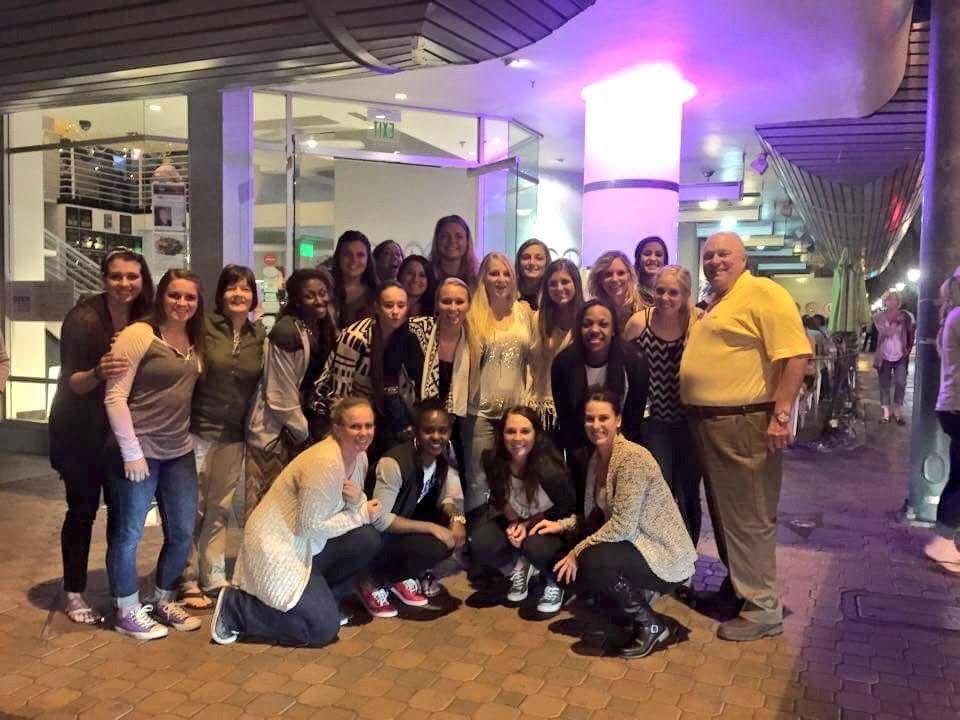LSU softball officially opened the Mike Moore Performance Center on Jan. 23. At its ribbon-cutting ceremony, donors, season-ticket holders, softball alumni and fans milled about the 14,500 square-foot turf infield. They peered up at its netting system, which can fall to form batting cages, and “The Mike’s” cardio equipment.
Construction began in the summer of 2018, and the facility was fully operational ahead of the 2020 season.
Patrons gawked at the weight room, the only one in the country solely for softball, and the state-of-the-art camera system, used for immediate film review during practice.
Of all the facility’s unique elements, the most notable one is its name: Mike Moore. Mike Sr. was not an LSU student, athlete, coach or administrator. He built swimming pools and served as a deacon at a small Southern Baptist church north of Shreveport. He was raised in the ‘60s on radio broadcasts of LSU football and train rides from Shreveport down to Death Valley. Although he did not attend LSU, he enrolled at Louisiana Tech but dropped out after one semester, joining the family business: Morehead Pools, a swimming-pool construction company.
Moore’s son, Mike Jr., is the President and CEO of his late father’s company. He sat in the front row of the ribbon-cutting ceremony while various speakers praised Mike Sr. He and his family then cut the ribbon with golden scissors and returned home to Shreveport.
A few days later, Mike Jr., hopped on a flight to Guatemala, where he attended a company sales training and leadership retreat, living out his father’s commitment to educating and empowering his employees.
Mike Sr. duplicated this business strategy in his support of the softball program. He willed their sustained success with a large subsidy. He may have also, unwittingly, forced the rest of the softball world to follow the template.
The Tigers left for their road trip in February of the undefeated 2015 season, winners of their first 11 games. The tournament marked the first time that Mike Sr. was fully immersed in the program away from home. He had reached the peak of his softball fandom, which had blossomed from a passion for football.
After he first started working at Morehead Pools in the late ‘70s, LSU fundraisers stopped in Shreveport on a tour, holding meetings at municipality clubs, mostly with wealthy alumni. Moore Sr. scored football season tickets on the East Side of Tiger Stadium, seats his family still owns today.
Mike Sr. was ordained a deacon in 1992 at a small Southern Baptist Church north of Shreveport and coached youth sports on the side, as he moved up the Morehead corporate ladder. After his mother’s death in 2000, he assumed ownership of the company and grew the business tenfold.
Mike Jr. played football at Louisiana College and worked as a counselor at summer camps of Fellowship for Christian Athletes (FCA). There he befriended a Northwestern State softball player named Lindsay Leftwich.
Leftwich joined LSU softball’s coaching staff when the team named Beth Torina head coach in 2011. Mike Jr.’s daughter had recently picked up softball, so Leftwich invited her to be a bat girl at Tiger Park. Mike Sr. took his granddaughter down to Baton Rouge for her first game and left impressed by what Torina and her staff were building.
“Man, I love that softball program,” Mike Sr. would tell his son. “There’s some good stuff brewing. They’re going to be really successful there. They’re going to build something special.”
When the team reached regionals in 2014, Mike Sr. decided on a whim to fly to Tucson, Arizona, to watch them face the University of Arizona. The Tigers lost the series on that weekend, but Mike Sr. found a new favorite sport, and LSU softball gained a valuable booster and mentor.
“He made the decision shortly thereafter that he was going to dive in head-first,” Quinlan Duhon said.
Duhon is the program’s Director of Operations and its liaison to the Diamond Backer Booster Club.
“We really all kind of fell in love with each other and each other’s energy,” Duhon said.
Tiger Athletic Foundation (TAF), the fundraising arm of LSU sports, met with Mike Sr. to gauge his interest in spearheading funds for a new practice facility after the 2014 season. He agreed to the proposal and spent more time around the team in the following season.
On the California trip, Mike Sr. stayed at the team hotel, attended each game and event over three days and ate every meal with the team. After the Tigers shut out Northwestern University on Saturday night, the team invited Mike Sr. to one final meal with the team before their flights left on Sunday morning.
“He was just absolutely in heaven,” Duhon said. “That was the one of the happiest days he had had.”
After a fun, relaxing evening, the team asked Mike Sr. to take a photo with them outside the restaurant. In the picture, Monica Moore, Mike Sr.’s wife, stands on the left with her arms around a couple of players. Mike Sr. stands on the right, smiling ear-to-ear.
Mike Sr. texted the photo to his son, who was at home.
“This team’s ‘gon do something this year,” he told him. “I can feel it.”
The next morning, Mike Sr. suffered a heart attack and died.
The team honored Mike Sr. by wearing a sticker with his initials on the side of their helmets for the rest of the 2015 campaign. They had a successful season, advancing all the way to the semifinals of the World Series.
The Moore family met with TAF officials during the 2015 season to carry out Mike Sr.’s commitment to the new facility. To memorialize their late father, Mike Jr. says the family made a larger investment in the project. TAF suggested that the new performance center be named after Mike Sr., and the Moore family obliged.
Empowering female athletes was one of Mike Sr.’s goals since the mid ‘80s, when he coached a youth softball team to a top-13 finish in the nation. The new facility achieved this goal.
“He saw the impact that he could have on young women,” Mike Jr. said. “And you know, you’re talking 1985. I mean even today, women’s athletics aren’t what men’s are, but in 1985 you can only imagine, right? Even smaller.”
He affected softball players of a previous generation with coaching and today’s athletes with donations.
Ben Ross is TAF’s Vice President of Development, the leader of their fundraising team. His predecessor, Ben Broussard, worked on the Moore project.
Ross imagines the state of the “Olympic” programs without private support.
“I still think that the program would be excellent,” he said, “but [donations] are the kinds of things that help you remain excellent.”
“It gives them the tools,” Mike Jr. said.
Private support puts collegiate athletic programs on the cutting edge. Upgrades to facilities and equipment enables athletes to maximize their potential. Often, one lavish facility will spark another in a different program, one that is bigger and better than the previous one.
“I do think,” Ross said, “for the upper tier programs, they’ll take a step back and evaluate, ‘what do we have, and do we need something like [the Mike Moore Center] to remain competitive and to be able to compete and recruit at the highest levels?’”
That would mean Mike Sr.’s support will drastically change the careers of not only LSU softball players, but also other athletes around the nation.
“I mean, these young ladies are getting an education,” Mike Jr. said, “they’re playing a sport, but then they go out and they do life after that, and so, it’s really key for that program to be creating the next generation of leaders with character, integrity, honesty, hard work, effort.”
“[Boosters] want to put these kids that give so much to the program in a position to be able to succeed, right?” Ross said, “To be able to have some of the best facilities to train in and to compete in and to make sure that they have everything necessary to realize their full capability.”
“You’re not buying anything,” he continued. “You’re investing in something, right?”
In the college softball world, the Mike Moore Performance Center is the new standard, set by a wealthy man who wanted to maximize his impact in the lives of young women.
“A dollar at Tiger Stadium and a dollar at Tiger Park,” Mike Jr. said. “You have a bigger impact with your dollar at Tiger Park.”







